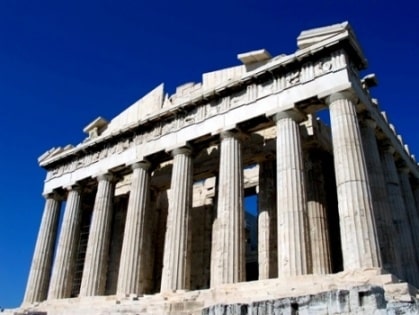By Doug Reynolds, Head of School
The ideas and principles that underpin Western Civilization date back to the days of Ancient Greece. The city state of Athens (and others) embraced the idea of democracy as early as the sixth century BC. In Greece, it was eventually the landowning adult males who were able to vote.
But it wasn’t just the vote for the common man that underpinned the aspirations of the society – it was a deep understanding of how virtue, justice, laws and government can work in and through the lives of a group of people to create a model society.
These ideas were codified in Plato’s Republic, written in about 360 BC. Plato’s great work has been read and reread by countless generations since to help leaders think through what a republican democracy means in their context.
Plato describes in book VII of the Republic the five different stages of a regime, or form of government[1]:
- Aristocracy – Plato’s ideal form of government where a kingdom is ruled by a “philosopher king” who rules with wisdom for his people.
- Timocracy – the form of government that degenerates from an aristocracy. Rulers are an elite group of those who control the wealth and use it for military conquest and power. Plato had Sparta of his day in mind when he wrote of a timocracy.
- Oligarchy – the next form of government whereby the leaders are chosen from the elite class of the wealthy. Power and decisions are in the hands of the few. Plato views this form as less ideal than a timocracy since the wisdom that might come from the poor is disregarded and the wealthy who control the government are not concerned about virtuous government.
- Democracy – Plato sees an oligarchy as descending into democracy, a system whereby the poor become the winners in the system and do not act with virtue in making decisions for the group as a whole. Love for money drives them and society descends into a more lawless state.
- Anarchy – Democracy descends into anarchy, when there is no order in society. In the end, a tyrant will take over to restore order. He is the worst sort of man and does not rule with wisdom and virtue.
While it’s tempting to try and position the current situation of the US in one of these stages, it is most helpful to recognize the warning signs from each stage and consider how we can avoid those. Our founders leveraged the insights from Plato and later Roman thinkers in order to establish timeless guiding principles for the United States (separation of powers, for example, between the three branches of the government helps guard against some of the issues Plato describes). Our founders also read extensively from Cicero, Plutarch and more modern advocates of a republic such as Locke.
It’s helpful for us in modernity to read and understand Plato’s Republic for the wisdom and lessons learned about how to create and maintain a just society and how to recognize where that has gone awry.
For instance, compare Plato with a study[2] released earlier this month. Researchers at Princeton and Northwestern looked at 1800 policy initiatives in the US over a recent 20 year period and concluded that the US is indeed an oligarchy – a system of government where the power and influence is in the hands of a few very wealthy people (finance and military). While the study does not reference Plato and his definition of oligarchy, the authors conclude that the US has moved away from ”democracy “and a place where it, in practice, recognizes the voice of its citizens. Instead, just the voices of the few are taken into consideration when policy and laws are written and implemented.
The authors of the Princeton/Northwestern study do not compare an oligarchy to the other types of regimes that Plato defines, yet they do write with a bias towards having a more balanced democracy, though a different definition of the democracy Plato defines. Understanding Plato can help us consider what democracy really is and if it is a good idea. Or did our founders have an answer for this as they wrote the constitution and formed our republic 230 years ago?
As it has been famously said, “Those who cannot remember the past are condemned to repeat it.”[3] So, while cultures have advanced and our world is not the same, we would be wise to seek the wisdom of Plato and the other authors that have shaped western civilization. How has democracy been defined across our many countries? What is the idea of democracy? Our goal should be to be able to look at it today through the lens of history and try to discern how to speak into its future so as to avoid the pitfalls of the past.

